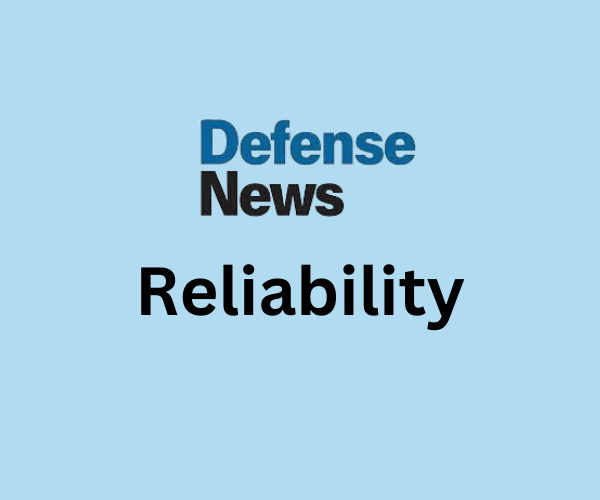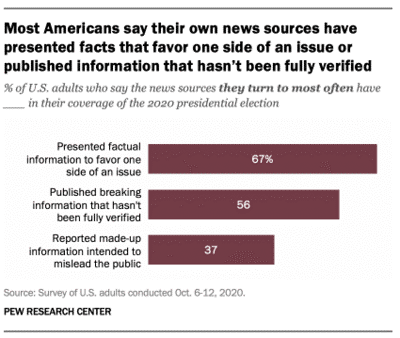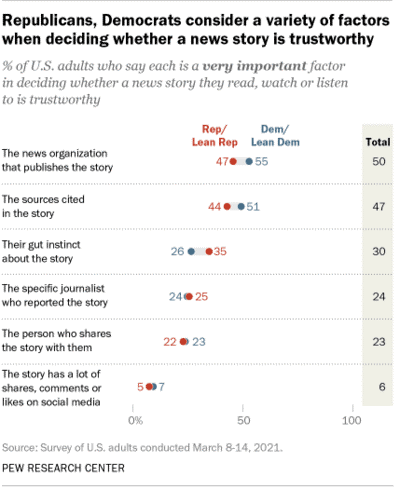
According to Biasly, Defense News has an Overall Reliability rating of Fair. The publication, according to Similar Web, had 3.2 million total monthly viewers in May 2024, making it one of the leading defense-oriented outlets. Considering the volatility and bias that can be associated with defense and international policy issues, it is exceedingly important to examine whether the information being presented by Defense News is reliable.

Source: Pew Research
Pew Research has found that 56% of Americans believe that their chosen news source has reported unverified information. Having such a large majority of people within the country perceive media as at least somewhat unreliable, investigating sources such as Defense News is pertinent.
Does Reliability Matter?
Reliability, in general, refers to how trustworthy or accurate information, or in this case, a news source is. If we consider this definition, it quickly becomes clear why reliability is important in media sources. If we can’t trust the things we read then there isn’t much of a point in continuing to consume content from that source, after all. So how exactly can we gauge the reliability of a news source anyway?
There are several potential measures of reliability to look out for when trying to determine whether a media source is reliable or not. Red flags for an unreliable article can include the presence of wild unsubstantiated claims, facts dependent on other unreliable sources, heavy use of opinionated language, and more. Some indicators of a reliable news source, on the other hand, include things like:
- Absence of subjective/opinionated language in articles
- Credible sources cited (e.g., neutral sources, .gov, .edu websites)
- Facts and statistics backed by multiple relevant outside sources
- Use of primary sources when possible (e.g., interviews, quotes)
- Information that remains consistent across news sources
How Does Defense News Fare in its Reliablity?
The political reliability index developed by Biasly objectively assesses news organizations’ accuracy and trustworthiness. Defense News’s overall Reliability Score has been rated as ‘Fair’ by Biasly.
Defense News’s Source Analysis Score is ‘Fair,’ which suggests readers can trust some of the sources, links, and quotes provided by the news source. This score, which is based on A.I., focuses on assessing the quality of sources and quotes used including their number, lengths, uniqueness, and diversity.
It is important to underscore that this score is based on an aggregate of rated articles, within individual cases there will be more diversity, meaning some will inevitably be more reliable than others. This could depend on multiple factors, such as the nature of the content, or even the specific author who writes the article.
Further, we will analyze the data available to help understand Defense News’s reliability, and help readers understand areas in which to narrow their attention in the ever-persisting effort to seek out trustworthy publications.
Defense News Accuracy and Reliability
Credibility may be the most important factor when it comes to how individuals view a news source. Proper reliability is specifically important for Defense News particularly since they mainly report on defense and war-related issues, an area which is both highly controversial and difficult to obtain proper sources.

Source: Pew Research
One can see from this Pew Research Survey that the sources cited within a story are at the forefront of importance when it comes to how trustworthy a news story is, along with that specific news outlet’s prior reputation. Many in the current media landscape have become sensitive to misinformation, thus it is important to understand the factors that allow it to persist.
Bias can come in many different formats, some may be easier to identify than others. Defense issues have a problem with sourcing, since much of their information may come from government or private sources who have an agenda regarding a conflict or politics. Therefore, it is of the utmost importance to assess the correctness and factuality of these articles.
Selection bias is when stories and facts are selected or deselected, often on ideological grounds, to create a narrative in support of the new sources’ ideology. Omission bias, on the other hand, is when different opinions and political views regarding a situation are left out so that the reader is only exposed to the ideological perspective supported by the author. It’s important to keep in mind these two types of biases when trying to assess an article’s level of accuracy.
As previously stated Biasly has rated Defense News’s reliability as Fair, meaning that overall the publication often gets sourcing correct, however, there are a few aspects that are below par on average. As stated previously each article will vary in its reliability. For example, we can see the news source CNN, according to Biasly, has a Somewhat Liberal analyst score in addition to a Good overall reliability score. Looking further, however, we can see that the article “UN Adds Israel to Global List of Offenders that Harm Children” according to Biasly received a reliability rating of Good. In contrast, CNN’s article “Opinion: The One Number that Could Decide the Fate of Biden and Trump” received a score of Fair. These cases, while not representing CNN in general, show that in cases where articles display the author’s opinion, reliability, such as sourcing of opposing viewpoints and selection/omission bias can often be an issue.
The article “China’s Defense Minister Defends Country’s Response to ‘Provocation’” received a Bias Rating of Center and a reliability rating of Fair. Within the story, they display the Chinese Defense Minister’s response to a recent naval altercation in the Taiwan Straight:
“Li said that the Canadian-U.S. voyage cannot be considered ‘innocent passage’,” and “[Foreign Militaries] should mind their own business”.
Even though this article maintains a mostly neutral bias throughout, the selection of these quotes along with the omission of the United States’ response to the situation could leave the reader with the assumption that the United States had or believed that they knew the activities they engaged in were provocative.
Analysis of Reliability in Defense News Opinion Pieces
Opinionated journalism can be a useful mechanism for gaining insight into different perspectives. Contrary to fact-based journalism where the reporter normally neutrally states facts on a certain subject, opinion pieces allow the author to argue a certain side of an issue, allowing the reader to understand at least one way some view certain topics.
Quality of Sources and Facts Used
Defense News with a Reliability Score of Fair is usually adequate when it comes to using multiple sources and quotes, but there are some issues with individual articles. For example, in the article “Adopt a Treaty for Semiconductor Export Control” the author used only three quotes throughout, additionally, they are all short quotes as they contain only 3 words or less. Longer quotes tend to be better for providing the full context of what the person was saying, giving less opportunity for the author to take that person’s words out of context.
The author for this source used 7 sources for the article:
- Pentagon eyes microelectronics hubs across US to bolster chip industry, Defense News (Center)
- Wassenaar Arrangement Fact Sheet, Arms Control
- Flash Points (Ukraine, China), Military Times (Somewhat Conservative)
- org
- How Biden’s microchip ban is curbing China’s AI weapons efforts, Defense News (Center)
- Executive Order 14105, Biden Administration
- Precision equipment for Russian arms makers came from U.S.-allied Taiwan, Washington Post (Medium Liberal)
In terms of the sole number of sources used the author does a good job ensuring that the arguments he makes throughout are backed up by documentation. He also cites a variety of sources with different leanings such as Military Times which is Somewhat Conservative and The Washington Post which is Rated as Medium Liberal. This shows that they are willing to hear and use evidence coming from a variety of perspectives and by proxy, allowing the reader to gain a balanced insight towards the issue. Due to the sheer lack of quotations throughout the article, the issue would be minimal, however, the author had no issue with taking improper or misleading quotes from those from which he sourced his information.
The reliability rating of Fair which Biasly gave this article is accurate because his use or lack thereof of quotations in the story is suboptimal, however, the number of sources and variety of sources including those with different viewpoints, is better.
The quality of the facts and evidence used within an article is also important, we will examine this next. For example, in his explanation of the Wassenaar Arrangement, he claims that:
“[Russia] has repeatedly exposed the inadequacies of this voluntary accord”.
This statement he made is true, in terms of restricting the importation of semiconductors that hold military use the Wassenaar Arrangement has done very little. The Carnegie Endowment for International Peace cites:
“In many cases, the same chips found in common appliances like microwaves are also sufficient to power Russian cruise missiles and battle tanks”.
Russia has been resistant to the sanctioning of multi-purpose semiconductors post-2022 when the global shortage waned. A significant reason is that the term ‘dual-use’ used in the Wassenaar Arrangement is too stringent for many semiconductors mainly used in civilian products that can also be fitted for military use.
Examining the validity of the facts presented within an article is important, the author of this article does a good job of asserting factual statements, irrespective of any issues reported previously.
The analysis of this opinion piece does not mean that every opinion article posted to the site has reliability problems. For example: “Bolster Sanctions to Stop Iran’s Growing Military Space Capabilities” has been rated as Excellent in reliability according to Biasly. Defense News does not solely release articles that do not use many quotations, in this article the author used multiple long quotations, in addition to a good number of sources which is what led to its Rating of Excellent.
Selection and Omission Bias
One example of Selection and Omission bias on Defense News can be found in the opinion article “Outsourcing Navy Shipbuilding Weakens the United States”, which singularly focuses on how the United States’ outsourcing shipbuilding weakens the country, leaving out any argument corresponding with the opposite viewpoint. The article also uses biased language, favoring right-leaning talking points.
“Many of the capabilities Navy leaders recently touted during overseas travel can be found right here at home, in American shipyards operated by an American workforce.”
Statements like this, omit any sort of benefit to the program, even if just in design, instead emphasizing bringing jobs back to America, along with others like national security and hostile foreign adversaries. These arguments emphasize a Conservative policy stance, and by proxy de-emphasize a liberal one. For example, the author could have made readers aware of a Liberal argument like global trade deals offering savings to consumers, in this case, the government.
The article discussed in the previous section “Adopt a Treaty for Semiconductor Export Control” does not have the same degree of Selection and Omission bias. The author, as mentioned previously, used a variety of sources with opposing tendencies, he underscores within the article that the Wassenaar Arrangement has many shortcomings while also promoting its importance. This offers the reader an equitable perspective on the proposal within his opinion.
It must be emphasized again that the articles analyzed within this section are opinion articles, the majority of articles published by Defense News do not contain the same level of bias. This is because the authors are purposefully making arguments in favor of a certain position which incentivizes them to select and omit certain data to cultivate a favorable view. Understanding these biases is important, however, as they allow one to gain a more knowledgeable perspective not just on opinion articles but all.
So is Defense News Reliable?
Defense News is a fairly reliable news source, and although their opinion pieces possibly contain a fair amount of bias and reliability-leaning issues, those are a small minority of what is published. Their fact-based journalism is mostly neutral in bias and Fair in reliability, apart from rare exceptions. Understanding media reliability will allow the reader to make more conscious and informed decisions about their media consumption habits. One way to ease this process is by using Biasly’s News Bias Checker to assist in seeking out reliability-related issues in addition to bias in articles.




























